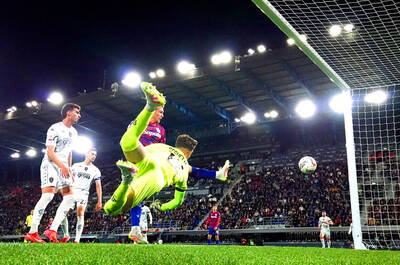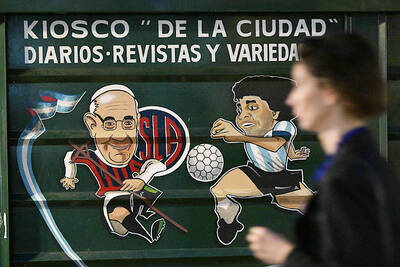Terrorist bullets shattered his spine, soccer’s indifference shattered his faith.
“It’s a rotten world,” says Kodjovi Obilale, Togo’s once-strapping goalkeeper left in a wheelchair by the attack on his team’s bus at Africa’s showcase tournament, the Cup of Nations, in January.
After eight long and, for Obilale, dispiriting months, during which time he went under the surgeon’s knife six times, world soccer’s governing body FIFA is now, finally, promising “concrete” help for the player who feels that he has been utterly forsaken by those who organized the Africa Cup in Angola.
“Excuse my language, but I think that is a bit disgusting. If I was a famous player like [Chelsea’s Didier] Drogba and the others, I don’t think things would have happened like this,” Obilale said in an interview this week at his hospital on western France’s Atlantic coast.
“I find it a bit abhorrent and sickening that they have abandoned me,” he says.
Two assault-rifle bullets “this big,” Obilale says, holding up a cigar-sized middle finger, hit his back, smashing two vertebrae and slicing through his intestines and bladder on their high-velocity path through his body. Surgeons repaired the stomach wounds, leaving on his smooth black skin a gnarly, raised scar two fingers thick from trouser-top to rib cage but the crush-damage to his spinal cord is likely irreversible.
“I used to have enormous thighs,” he says. They’re spindly now.
He cannot move his right leg below the knee, nor feel its foot and toes. With his plate-sized hands and muscular arms that once defended Togo’s goal, Obilale hoists the dead leg onto a bed where his cheerful physiotherapist, Marie Penven, sets about stretching, pulling and flexing his limbs and joints. The daily routine prevents Obilale’s withered muscles from seizing up completely from lack of use, she explains. Her vigor and soft bare feet are, inadvertently, an insolent reminder of the formidable physical abilities Obilale has lost.
“I used to wear XXL now it’s L. I’ve become a fashion model, thin legs,” he jokes.
parallel bars
But his humor deserts him as he shifts gingerly and painfully from the bed to a nearby set of parallel bars where, gripping hard with both hands, he shuffles along upright in what cannot, yet and may never, be called a walk.
“Ouuuch!” he winces. “Oh, what a life ... My gosh.”
“The big concern is my right leg, that worries me, I don’t know what is going to happen with it. I pray for it to get better, so I can at least walk again,” he says. “Even if I cannot play again, I want to walk, even if I limp, that wouldn’t matter, because there is more to life than football, I can do other things. I’m only 25.”
But to have a viable future beyond soccer, Obilale needs soccer’s help and it is shameful for the sport that he has to cry out for it.
Not once, Obilale says, has he been contacted by the Confederation of African Football (CAF), organizers of the biannual Africa Cup, or Angola, the southwest African nation picked as this year’s host despite the rebellion by separatists in its oil-producing Cabinda region who claimed the machine-gun attack on Togo’s bus.
From the word go, CAF’s handling of the attack was atrocious.
Because Togo pulled its shell-shocked team out of the Africa Cup, CAF banned the country from participating in the next two competitions. Only after FIFA boss Sepp Blatter intervened did CAF rescind its heartless punishment.
His own country, Obilale says, has been only marginally more responsive. He said he has had to harass officials in Togo by phone for help and embarrass them by speaking to reporters of his plight.
“When you are injured, everyone forgets about you,” Obilale says. “I call [and say]: ‘What are you doing? I need you. Call me at least.’ I went there [to Angola] to defend our colors ... I spilled my blood for my flag ... but no one budges.”
In South Africa, where Obilale was medevaced for surgery after the attack, Togolese Sports Minister Christophe Tchao gave the cash equivalent of US$17,000 to Obilale’s partner, both men say.
In a phone interview, the minister said Obilale also got roughly the same amount again sometime later. Obilale, however, insists that is untrue.
“Was he drunk or what? Each time, he lies to journalists,” he says.
shortfall
He also says the money received in South Africa didn’t cover the entirety of his partner’s hotel and other expenses during the weeks she spent there. Obilale says he and Emmanuel Adebayor, his wealthy friend who plays for English Premier League side Manchester City, made up the shortfall.
Either way, signs started to emerge this week that help, at last, is on its way from FIFA, the only body that Obilale feels really has the power to force CAF, Angola and Togo to get their act together and come up with a decent compensation package.
“The only person who can shift all this is Mr Blatter,” he says of the FIFA president.
In another positive, Obilale also said that a payment of US$70,000 promised by Togo’s sports minister when he visited him in France a month ago has finally landed in his bank account.
Obilale says the money will cover his hospital bill and the rent on his apartment in Lorient, where his partner and two children, Mandy, 8, and Hauvik, 2, live.
He has the kids’ names tattooed on his forearm and leaves the hospital to visit them on weekends, hauling himself up the stairs to his home, sometimes sitting down on his behind if he is too exhausted to climb them upright. He sometimes suffers spasms like electrical discharges in his right leg that keep him awake at night. With the newly arrived funds, he hopes to move into a house with wheelchair access.
If short-term, things seem this week to be looking up, Obilale’s battle for a full life after soccer is still to come.
The Togolese minister said that Angola was insured and that his government is in contact with its counterpart there about compensation. Since the process is in lawyers’ hands, who knows how long that could take.
There’s also the mental trauma and unanswered questions Obilale lives with about why separatists targeted them and why Angola and Togo made the team take a bus when, he says. “They knew that the zone wasn’t safe.”
The team’s assistant coach and its press official, as well as their Angolan bus driver were killed.
‘CROAKED’
“If we hadn’t had an escort, we all would have croaked. Because the guys were shooting the windows, the bus, and the [Angolan] soldiers were firing back. That is what — in brackets — saved our lives,” Obilale says.
“I can’t understand it. I’m still trying to understand it and I won’t give up the search for the truth. They took a part of my life away,” he says. “I want to play football. That has been my dream since I was a kid and now that dream has brutally been cut short. That hurts me a lot. I think about it every day.”

Bologna on Thursday advanced past Empoli to reach their first Coppa Italia final in more than half a century. Thijs Dallinga’s 87th-minute header earned Bologna a 2-1 win and his side advanced 5-1 on aggregate. Giovanni Fabbian opened the scoring for Bologna with a header seven minutes in. Then Viktor Kovalenko equalized for Empoli in the 30th minute by turning in a rebound to finish off a counterattack. Bologna won the first leg 3-0. In the May 14 final in Rome, Bologna are to face AC Milan, who eliminated city rivals Inter 4-1 on aggregate following a 3-0 win on Wednesday. Bologna last reached the

If the Wild finally break through and win their first playoff series in a decade, Minnesota’s top line likely will be the reason. They were all over the Golden Knights through the first two games of their NHL Western Conference quarter-finals series, which was 1-1 going back to Minnesota for Game 3 today. The Wild tied the series with a 5-2 win on Tuesday. Matt Boldy had three goals and an assist in the first two games, while Kirill Kaprizov produced two goals and three assists. Joel Eriksson Ek, who centers the line, has yet to get on the scoresheet. “I think the biggest

From a commemorative jersey to a stadium in his name, Argentine soccer organizers are planning a slew of tributes to their late “Captain” Pope Francis, eulogized as the ultimate team player. Tributes to the Argentine pontiff, a lifelong lover of the game, who died on Monday at the age of 88, have been peppered with soccer metaphors in his homeland. “Francisco. What a player,” the Argentine Football Federation (AFA) said, describing the first pope from Latin America and the southern hemisphere as a generational talent who “never hogged the ball” and who showed the world “the importance of having an Argentine captain,

Noelvi Marte on Sunday had seven RBIs and hit his first career grand slam with a drive off infielder Jorge Mateo, while Austin Wynn had a career-high six RBIs as the Cincinnati Reds scored their most runs in 26 years in a 24-2 rout of the Baltimore Orioles. Marte finished with five hits, including his eighth-inning homer off Mateo. Wynn hit a three-run homer in the ninth off catcher Gary Sanchez. Cincinnati scored its most runs since a 24-12 win against the Colorado Rockies on May 19, 1999, and finished with 25 hits. Baltimore allowed its most runs since a 30-3 loss to